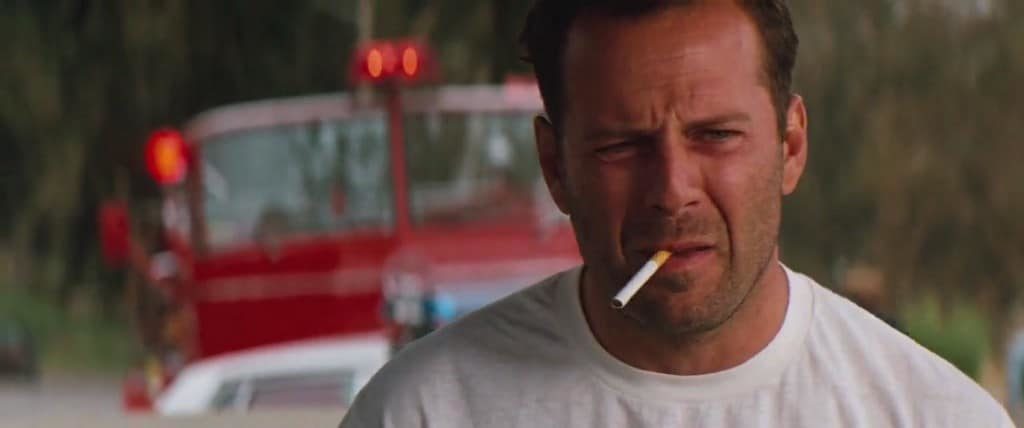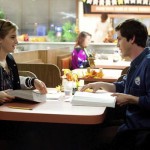The Last Boy Scout Review

RATING: 



(3.5 STARS)
It’s easy enough to look at The Last Boy Scout and assume it’s a close relative of 48 Hrs. or Lethal Weapon. They’re all action comedies to one extent or another. They feature an interracial pair with contrasting and clashing styles investigating a crime or larger criminal conspiracy. And in the case of The Last Boy Scout and Lethal Weapon, they share the same screenwriter – Shane Black.
Black, whose career burned white hot in the late 80s and early 90s before he flamed out and reappeared in the mid-2000s with Kiss Kiss Bang Bang and Iron Man 3, earned $1.75 million – a record at the time – for his The Last Boy Scout screenplay. He says he wrote it while he was mourning a relationship that ended and feeling a little bitter about life in general.
That comes through in the film in a BIG way, and the primary difference bewteen The Last Boy Scout and some of the other similar films that preceded it is that The Last Boy Scout is extremely hard-edged, borderline nihilistic, with its characters. Joe Hallenbeck is one of the least fun characters I’ve ever seen, but he’s so jaded and broken that he swings in the other direction and becomes rather amusing. The film’s plot is super high-concept and doesn’t come all the way together, but not unlike Beverly Hills Cop, the film stands high on the shoulders of the chemistry between its characters and the unique charisma of its lead.
The film begins with a truly crazy scene that’s almost a non-sequitir except for the fact that it tells us this film is not grounded on planet Earth and to not expect it to ever come down. It’s Friday night, which means professional football in America (for some reason). Los Angeles’ team, the Stallions, are playing a hard-fought game in Cleveland in biblical pouring rain. On the sidelines, star player Billy Cole (Tae Bo frontman Billy Blanks) gets a call from someone who delivers a rather menacing message: Score and win this game … or else. He enters the game and takes the ball way downfield, but as the defense threatens to bring him down, he pulls out a pistol and shoots three opposing players on his way to the end zone. The crowd flees. The cops swarm. And Billy turns the pistol on himself. His last words: “Ain’t life a bitch?”
The rest of the film follows a strung-out private detective, Hallenbeck (Bruce Willis), and the disgraced former star quarterback of the Stallions, Jimmy Dix (Damon Wayans). We meet the former as he finds out his wife, Sarah (Chelsea Field), is sleeping with his partner, Mike (Bruce McGill). Shortly thereafter, Mike is killed by a car bomb outside of the Hallenbeck house, so Joe picks up Mike’s job protecting Jimmy’s stripper girlfriend, Cory (Halle Berry), from … well, we’re not totally sure who or what. But the threat becomes real when Hallenbeck is knocked unconscious, and she gets killed. Jimmy barely escapes, and the two men pair up to get to the bottom of what happened.
The actual plot behind Cory’s death is complicated to the point of frustration. She had a dalliance with the owner of the Stallions, Sheldon Marcone (Noble Willingham), and wants to use this to get Jimmy back into the league. He was tossed out for gambling on games, and Joe thinks football is lost without Jimmy. Whatever the reason, though, viewership is way down, and Marcone gets involved with a gentleman named Milo (Taylor Negron) who is helping him deal with a U.S. senator who wants $6 million from Marcone in exchange for his vote to legalize sports gambling, which would in turn make the sport and Marcone’s team profitable again.
Joe has a connection to this senator. He’s the reason why Joe is so jaded, but he wasn’t able to take Joe’s moral compass away from him, and when Joe’s feisty teenage daughter, Darian (Danielle Harris), asks Jimmy to sign her trading card, he writes, “To the daughter of the last boy scout.”
Like I said, it’s a COMPLICATED film, but you sort of let some of the sillier details slide because Willis is so damn good. I almost hate saying so because the film was by most accounts a total nightmare to shoot, and his name pops up most often as the source of the set’s sore feelings. But he reads Black’s acid-soaked dialogue with real relish. When his wife says their daughter is getting bullied by the boys at school, Joe tries to reassure her by saying, “She’ll be fucking them by the time she’s fourteen.” And when he wakes up one morning in his car, he looks in the mirror and tries to start the day with a note of positivity saying, “Nobody likes you. Everybody hates you. You’re gonna lose. Smile, you fuck.”
It’s kind of strange seeing him paired with Damon Wayans, a guy whose career just didn’t quite take off the way those involved here must have imagined back in 1991. He’s fine as Jimmy, but he doesn’t ever really shine with such a perfectly cast megastar beside him. The only other real standout in the cast is Negron, who I was familiar with in guest roles on Seinfeld and Curb Your Enthusiasm. To see him play such a snarling villain was a surprise, but one I enjoyed.
This film represents the beginning of a two film run where Tony Scott directs great movies that were written by legendary screenwriters, and I think it’s these two films that unfairly cement his legacy as a director for hire. His filmography to date is one that, at least to a certain extent, defines its era. Going forward, he’ll shift gears a bit, and he certainly benefits from working with Black, but he also brings a lot of his own energy to The Last Boy Scout that I’m so happy to uncovered.













